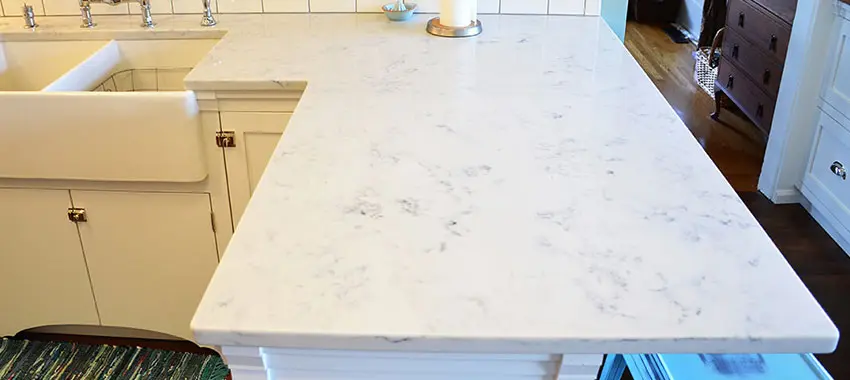Aug
Causes of Stain on a Quartz Countertop
- 2022
- FlintstoneCounters
Quartz countertops are made using two main materials: natural quartz and polymer resins. Natural quartz is the one that is impervious to different liquids, non-reactive, and impermeable to gases.
The polymer resins are binding the quartz particles. However, in certain conditions, the polymer might experience some chemical transformations. This can occur if you leave behind any harsh chemicals on the countertop for a longer period.
Slow reactions can lead to staining. This might sound alarming but different manufacturers use stable polymers with high resistance to chemicals, which makes countertops safe for preparing food. The quartz will unlikely stain since it is non-porous and hard.
Here are the causes of staining on a quartz countertop.
Acids
Acidic liquids such as vinegar are a huge no-no regardless if you have granite or quartz countertops. The spills can be wiped off, but you can try to prevent your vinegar from drying on the surface. The same goes for wine. The wine stains can be cleaned easily, but when you cook using these ingredients together with balsamic vinegar, you would want to clean up all the mess right away.
From Cleaning Chemicals
You must never use chlorine or bleach-based products on your countertop. These are corrosive chemicals and cause heavy etching. When you use these chemicals, the sealant can also degrade on your countertops.
The time you can use bleach is through deep cleaning where you might have to use it on the surfaces inside your home. It can be used once the quartz countertops are dry and then it should be immediately wiped off.
The top cleaning solution you can use for quartz countertops is a commercial-level cleaner that is primarily made for stone surfaces. These cleaners are going to ensure that your quartz countertop will always look new and shiny for many years to come.
Coffee and Tea
Like wine and vinegar, you should never allow coffee and tea spills to linger on the quartz countertop until it becomes dry. The tannins that give these drinks their colors will slowly penetrate your quartz countertop’s seal. Through time, this will slowly make your countertops appear more aged than it is. Thankfully, the majority of coffee stains can easily be removed using a quick wipe of a damp cloth. For the tougher stains, you can use a granite cleaner and mild quartz.
Heat Damage Caused by Hot Pots
Similar to hot spills produced by coffee, oil, etc. It can cause your quartz surfaces to get badly stained, heat damage coming from hot pans, and others can cause stains to appear on the quartz.
If you put a hot pot on the quartz surface, the heat damages the resins that hold the stone together which causes staining.
Even if you can use a hot pad or trivet to prevent any heat damage, you should avoid putting anything that goes directly on quartz surfaces.
In case you end up with heat damage, talk to a professional right away to restore the surfaces. They can provide you with resurfacing and cleaning solutions that effectively remove stains without damaging your quartz surface.
Sealants
As much as you want to keep future stains from happening with physical barriers, you should not use sealants that are for natural slabs. Quartz is non-porous, while natural slabs are, which means the sealants will not absorb and adhere.
Sealants are not going to be effective on quartz surfaces, and sometimes, sealants can change the color of quartz surface so it becomes hazy.
You can contact quartz countertop installer Rockville anytime if you have questions about the care and maintenance of your countertop.


